

Professional Development and Professional Learning #miamidevice – The Principal of Change. Simply processing through writing… Sitting in Adam Bellow’s session this morning discussing “professional development”, I tweeted the following:
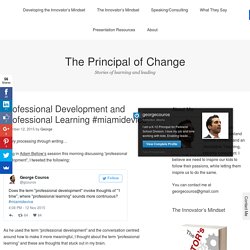
How to Go Rogue Respectfully. Click the image for the full series.
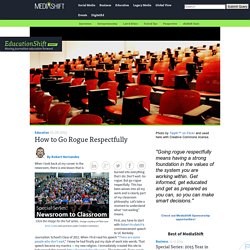
(Image courtesy of Flickr user Brett Jordan and used here under Creative Commons.) When I look back at my career in the newsroom, there is one lesson that is burned into everything that I do: Don’t wait. Go rogue. But go rogue respectfully. What makes for effective PLD? At a meeting I attended last week a group of people were discussing approaches they might use to 'bring teachers up to speed' with the ideas and approaches they were discussing (in this case, computational thinking).
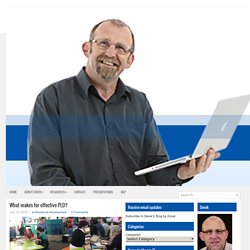
The discussion that ensued raised all of the usual issues around why it's difficult to find effective PLD solutions: teachers are time poor, the overloaded curriculum, lack of expertise, reluctance to change etc. When turning their attention to finding a solution the predictable list appeared: provide more teacher only days (TODs), introduce a range of incentives (carrots), introduce mandatory requirements (sticks) etc. The discussion also ventured into the problem with providing PLD support that is 'just in time' rather than that which is 'just in case'.
Effective professional learning and development has the following four characteristics:It is in-depthIt is provided over timeIt is related to practiceIt is contextually relevant Such moves are not surprising. Quality relationships for complex times. I was with a client a few weeks ago in an unusual sort of gig for me—I walked into a leadership program I didn’t design and wasn’t teaching and spend two days with the participants before flying off into the sunset again.
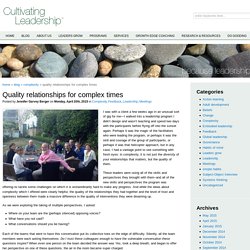
Perhaps it was the magic of the facilitators who were leading the program, or perhaps it was the skill and courage of the group of participants, or perhaps it was that helicopter approach, but in any case, I had a vantage point to see something with fresh eyes: in complexity, it is not just the diversity of your relationships that matters, but the quality of them. These leaders were using all of the skills and perspectives they brought with them–and all of the new skills and perspectives the program was offering–to tackle some challenges on which it is extraordinarily hard to make any progress.
As we were exploring the taking of multiple perspectives, I asked: Where on your team are the (perhaps silenced) opposing voices? What have you not said? AnneKcam: The power of feedback and feedforward... As I journey, I am increasingly aware of the need to capture some feedback for my own inquiry.
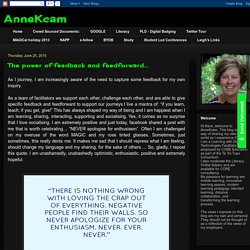
As a team of facilitators we support each other, challenge each other, and are able to give specific feedback and feedforward to support our journeys.I live a mantra of: “if you learn, teach; if you get, give!” This has always shaped my way of being and I am happiest when I am learning, sharing, interacting, supporting and socialising. Yes, it comes as no surprise that I love socialising. I am extremely positive and just today, facebook shared a post with me that is worth celebrating… “NEVER apologise for enthusiasm”. Often I am challenged on my overuse of the word MAGIC and my rose tinted glasses. The Optimism RevolutionIncreasingly I am aware of the basic human need of recognition, affirmation, acknowledgement. Effective collaboration in education. Teaching Science in the 21st Century: Innovation Leadership in Schools. This article has been cross-posted to Getting Smart.
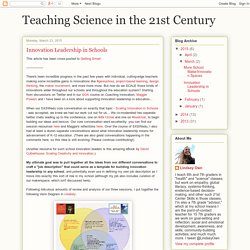
There's been incredible progress in the past few years with individual, cutting-edge teachers making some incredible gains in innovations like #geniushour, project-based learning, design thinking, the maker movement, and more more more. But how do we SCALE those kinds of innovations wider throughout our schools and throughout the education system? Starting from discussions on Twitter and in our GOA course on Coaching Innovation, Maggie Powers and I have been on a kick about supporting innovation leadership in education... When our SXSWedu core conversation on exactly that topic - Scaling Innovation in Schools - was accepted, we knew we had our work cut out for us... We co-moderated two separate twitter chats leading up to the conference, one on #dtk12chat and one on #isedchat, to begin building our ideas and lexicon.
So, here goes nothin' - Adult Learning Theory and Principles. Become familiar with Adult Learning Theory and the six principles of adult learning Adult Learning Theory Part of being an effective educator involves understanding how adults learn best (Lieb,1991).
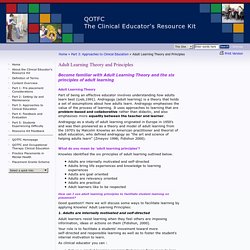
The Importance of Andragogy in Education. As educators one would expect that teachers and teacher/administrators should be experts on the best most effective and efficient methods of getting large groups of children to understand, learn, and use information responsibly to create more information.
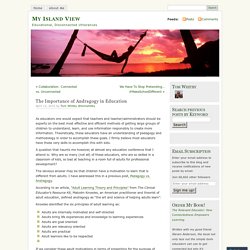
Theoretically, these educators have an understanding of pedagogy and methodology in order to accomplish these goals. I firmly believe most educators have these very skills to accomplish this with kids. A question that haunts me however, at almost any education conference that I attend is: Why are so many (not all) of these educators, who are so skilled in a classroom of kids, so bad at teaching in a room full of adults for professional development? The obvious answer may be that children have a motivation to learn that is different from adults. I have addressed this in a previous post, Pedagogy vs.
Teaching Science in the 21st Century: Introducing Design Thinking to School Faculty. On Wednesday, I was part of a facilitation team leading a 3-hour workshop for our whole school's faculty and staff (about 100 people) introducing Design Thinking.
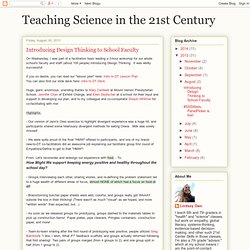
It was wildly successful! If you so desire, you can read our "lesson plan" here: Intro to DT Lesson Plan You can also find our slide deck here: Intro to DT Deck Huge, giant, enormous, unending thanks to Mary Cantwell at Mount Vernon Presbyterian School, Jennifer Chan of Exhibit Change, and Ellen Deutscher at d.school for their input and support in developing our plan, and to my colleague and co-conspirator Shaye' Whitmer for co-facilitating with me! 7 characteristics of a true connected educator. We are in the thick of Connected Educator Month and, despite all the juggling of tasks and ideas and events and a hundred other things, my mind has been delving into the ‘why’ and ‘so what’ of it all.
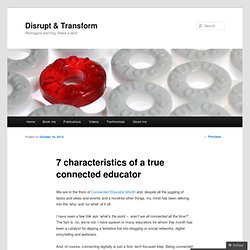
I have seen a few folk ask ‘what’s the point – aren’t we all connected all the time?’ . The fact is, no, we’re not. I have spoken to many educators for whom this month has been a catalyst for dipping a tentative toe into blogging or social networks, digital storytelling and webinars. And, of course, connecting digitally is just a first, tech-focused step. The following ideas were the basis of my session at ULearn14; an abridged version (and livestreamed version) is below. I drew on the whakataukī (Māori proverb) below for inspiration: 8 Steps To Flipped Teacher Professional Development. 8 Steps To Designing A Flipped Teacher Professional Development Program: Shifting From Corrective Training To Staff Capacity Traditional teacher professional development depends on external training handed down to teachers after having identified their weaknesses as a professional.
If you’re not so great at teacher writing, or if assessment is becoming a bigger focus in your school or district, you fill out a growth plan of some sort, attend your training, get your certificates, and repeat until you’ve got your hours or your school has run out of money to send you to more training. Oftentimes these “professional growth plans” are scribbled out in 15 minute meetings with your principal, then “revisited” at the end of the year as a kind of autopsy. What would happen if we flipped this model on its head? Wed, 10 Sep 2014 - Catherine Wooller's Teaching & E Learning Journey.
EduCampNZ Flow in Five - Google Slides. The Key to Empowering Educators? True Collaboration. Teaching Strategies Educators around the world are making a special effort to connect with one another around resources and collaborative opportunities during October, Connected Educator Month. It’s a time to share ideas, remember that there are others that think alike and find the inspiration to continue to do the tough work of experimenting with teaching strategies that stretch both learners and educators. A key theme this year is how to move from merely connecting with other educators into collaborations that push pedagogy and the education conversation forward.
Acesnet - Participation Ideas. VirtualNorth: Go West! EduCamp Auckland is heading west again in 2014. This year's unconference event will be on Saturday 26th July at Western Heights School, Henderson thanks to principal +Ash Maindonald and his team for hosting.Follow #EduCampAKL on Twitter and check the wiki for updates and tips for how you can participate and contribute. Collaborative docs will be live early Term 2 to register your interest.EduCampAKL is a free, unconference event where participants are encouraged to "go with the flow, follow their passion and take responsibility for their own learning"(unconference.net).
6 characteristics of great PD (and great classrooms) 1. Constructivist The best PD workshops are constructivist, or marked by experiential learning. In these workshops participants are actively discovering the features, properties, and potential of a tool, app and a device.